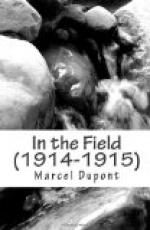For three days we had been pursuing and fighting the German army, and we were tired out; but we had not felt it until the evening on stopping to give our poor horses a little rest. Before the last mouthful had been swallowed several of us were already snoring with their heads on their arms upon the table.
The rest were talking about the situation. The enemy was retreating rapidly on the Marne. He must have crossed it now, leaving as cover for his retreat the division of the Cavalry of the Guard which our brigade had been fighting unceasingly ever since the battle of September 6. Would they have time to blow up all the bridges behind them? Should we be obliged to wait until our sappers had built new ones before we could resume our pursuit?
We were particularly anxious about two fine officers that our Colonel had just sent out that night on a reconnaissance—F., of the Chasseurs d’Afrique, and my old friend O., of our squadron. We wondered anxiously whether they would be able to perform their task—to get at all costs as far as the Marne, and let us know by dawn whether the river could be crossed either at Mont Saint Pere, Jaulgonne, Passy-sur-Marne, or Dormans. Nothing could have been more hazardous than these expeditions, made on a dark night across a district still occupied by the enemy.
The night was short. Before day dawned the horses were saddled and the men ready to mount. And as soon as the first rays of morning filtered through, my squadron, which had been told off as advance guard of the brigade, rapidly descended the steep slopes which commanded the small town of Conde. A.’s troop led. My business was to reconnoitre the eastern part of the town with mine, whilst F., with his troop, was to see to the western quarters.
With sabres drawn, our Chasseurs distributed themselves briskly, by squads, through the streets of the old city. The horses’ hoofs resounded cheerily on the paved streets between the old grey houses. The inhabitants ventured out upon their doorsteps, in spite of the early hour, with some hesitation at first, but glad indeed when they saw our light-blue uniforms; they cheered, crying: “They are gone!... they are gone!” But some old folk replied more calmly to my questions: “Monsieur l’Officier, have a care. They were here an hour ago with a large number of horses and guns. There was even a general, with his whole staff, lodged at the great house up there.... We would not swear that some of them are not there still.”
I collected my troop, and then went quickly to the chateau which stood at the northern entrance of Conde. It was rather a fine building, but I had not time to notice its architectural style. Haste was necessary, for the brigade behind me was due to arrive. As far as I remember, the chateau formed a harmonious whole, and the different parts of it showed up cheerfully against the dark foliage of the park, which was still glittering after the night’s rain. The building was in the form of a horseshoe, and in the centre there was a kind of courtyard bordered by two rows of orange trees in tubs.




